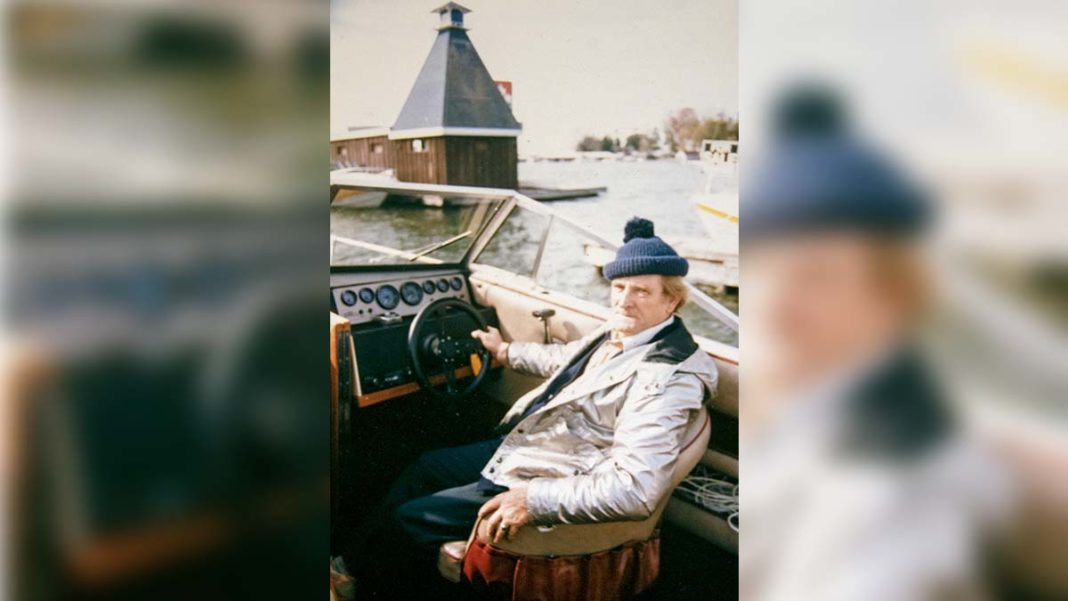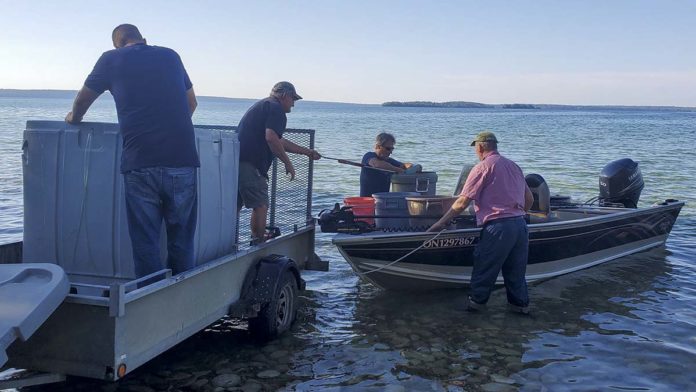by Petra Wall
David arrives at the boardroom of the Centennial Manor, offering his hand as he approaches. A business-like handshake ensues. Getting into the Manor as a guest these days requires certification of immunization, hand disinfection and a clean rapid test, with 15 minutes of waiting time. David, 90, his mobility enhanced by a walker, smiles, and sits down at the big table. Twenty minutes earlier, while waiting for test results on the bench outside, the writer notices the fancy electric ride, David’s alternate transportation mode, ready to take him into town.
After chatting for a few minutes, it becomes clear that David has led an interesting life. A life filled with the challenges of living through a world war, moving to a new country and evolving family relationships. It was the honing of skills in ballroom dancing with his second partner that became his ‘raison d’etre.’ His first memories begin in pre-war Britain, with 13 siblings. They move to the despair and isolation of the war years and the subsequent, decisive move to Canada. That emigration from post-war Britain would sow the seeds of a new beginning, one that would escape the joblessness of the old country and the ongoing restrictions of rationing. Today, his memories, self-declared to be softened by time, still include that expertise and love for ballroom dancing.
“A distant relative was a gunmaker in Birmingham in 1750. I found him in the census records that went back 300 years. At that time industrial workers who migrated to cities to find employment were more like serfs. Birmingham became an industrial center for manufacturing. My grandfather was lucky to have his own shop, “Parker’s”, inherited from his father. Grandfather also became a government agent, dealing with swords and weapons he procured for the soldiers. We had one of his bayonets used in the Boer War. It hung over the door in our house all the years I was there.”
“When World War I came to Britain, my father Albert Parker joined the war effort. Dad fought in the Battle of Vimy Ridge, and I understand that his name is carved into one of the tunnels that the soldiers had dug for their shelter. Father was in the Worchester Regiment, the same one my brother joined for World War II. At that time, if a soldier was found outside of the designated conflict area, he could be charged or shot for desertion. My wounded father luckily escaped this fate when he was found outside of his area by New Zealand troops. Luckily, they chose to keep him away from the British military.”
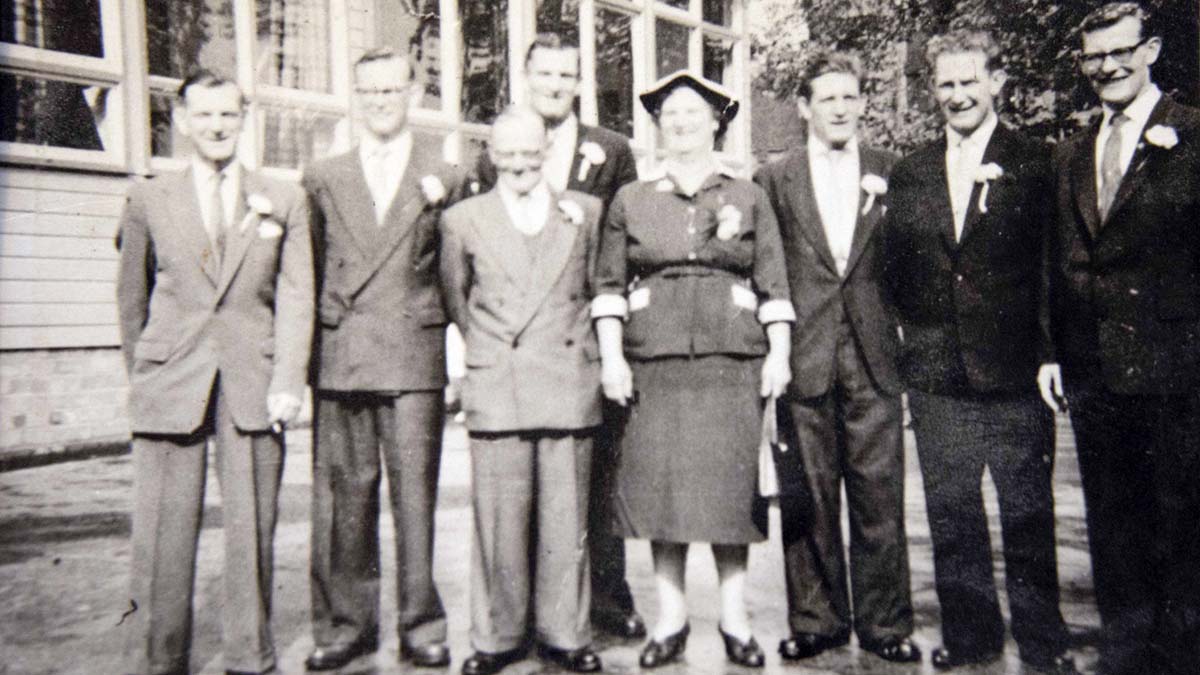
David, the third son, was born to Lillian and Albert Parker on June 23, 1932. “The Prince of Wales, who would later briefly become King Edward VIII (before he abdicated) happened to be visiting the hospital so mother named me Edward David Parker. The King later abdicated from his throne to marry his sweetheart, Wallis Simpson. That was a shock to everyone. Years later, a similar response was felt when Diana left her Prince Charles. She was such a beauty; people were broken-hearted about her departure.”
“After the family was complete, 15 people were sharing a three-bedroom house with no inside bathroom and no kitchen. Winters were always cold, and at night we all used chamber pots which yielded slop that had to be emptied. The male siblings were Nevil, Mervin, David, John, Albert and Sidney. Six of the seven girls were Lily, Rose, Jean, Kate, Ina (Georgina) and Margaret.”
“In about 1936, the ‘Blimp’ passed innocently over our house on the outskirts of Birmingham, where we lived. I remember the fear and pain of the subsequent war years. Every night, starting in late 1939, bombs plagued the main cities. The first bomb would be a distance away. By the time we heard the fourth bomb hit a nearby target, we would run into the cellar, damp and cold from the stored coal. No toilet was available. During those years, we developed impetigo and other diseases from the poor conditions we were constantly exposed to. Some of our neighbours dug tunnels to escape to, or they built air-raid shelters in their back yards. The house across the street was hit and it cracked down the middle. The front, second and middle doors wound up in a heap in the back yard.”
“The Germans were systematically bombing each of the big cities, one after the other, using a method of locational bombing that kept us all up at night. I remember when I was eight, going into the downtown area of Birmingham with my parents. The city center was filled with fire and smoke. There were hills of dirt over the water pipes so that fire engines could get over them. We found the ‘bull ring,’ the big market center with the huge glass roof, bombed and burning. Animals were trapped inside. Those animals that survived were soon released into the city. We found strange birds and animals in the countryside for quite a while.”
“When the sirens went off at school, we would run to the basement. I missed much of our schoolwork, but I remember reading Agatha Christie books. Parents were getting fearful that gas weapons could be used against the population, so they conspired to get the younger children out of the cities and into the countryside. One Monday, we were bundled up and taken by bus to the railway stations with many other children. That was laundry day at our house, so we had only wet clothes to wear. There were four children from our family, but we were split into two groups. Mervin and John went to the hamlet of Emily Castle, a town which had lost its castle much earlier to Henry VIII.”
“My younger brother Nevil and I arrived at Netherton to stay in a 100-year-old thatched cottage with a farmer and his wife. The next day we were brought to a house with a giant table laden with clothes we could use. I remember seeing pair of little girl’s slippers, with buttons, that might be useful on a cold stone floor. Far in the distant cities, we could see a glow in the sky and hear the bombs going off.”
“We had never seen farm animals: cows, horses, pigs and chickens. The fence around the chickens had openings big enough for us to sneak in and pinch a few eggs. We also found a duck’s nest filled with eggs at one end of the barn. After a while, it was clear the farmer and his wife, a nurse in the city, were not happy with us. We became too much of a problem, so we were taken to Pershore, still in Worcestershire County. That home couldn’t take us, so we were taken to another couple who worked in a grocery store. They had rooms and took us in, but they didn’t feed us very well. One day we found a cake covered with nuts and we ate all the nuts. As punishment, we had to pick up stones in the back yard.”
“Our parents had been paying a monthly fee to keep us safe in the country, a fee they could barely afford. They visited us once. By this time, brother Albert had joined the air force and the family dynamics were changing. We were still far away from the life we knew and we felt we were not being fairly treated. At the end of the visit, our parents gave us some candy. As soon as our parents were out of sight, the candy was taken from us. I decided to take drastic action. Nevil, five, and I, eight, walked to the bus station and bought tickets to Worcester where we got off. We played dumb. We told the conductor that our mother had really bought a ticket to Birmingham. They finally let us on the bus. By then our parents had learned of our escape. They worried we might drown in a nearby river. Meanwhile, much to their amazement, we arrived home safe and sound. We stayed there for the rest of the war.”
“During the war, the National Service had provided infrastructure for the Third Infantry Division of three to four-thousand soldiers. Their collective footprint had extended from Norway to Persia. After the war, Britain was slowly granting independence to the countries of the Empire, a double-edged sword. Once the British were gone, there were no soldiers to defend democracy and keep the peace. Inner turmoil proliferated in many states. After the war, the National Service had adopted a standardized form of peaceful conscription so they could offer transitional help to the new countries.”
“In Britain, when you join the National Service, you worked full-time for two years, earning 50 cents a day. After that you offered services as part of the Reserve Army for another five years. I joined the British army at 18, joining REME, the Royal Electrical Mechanical Engineers deployed to the Suez Canal in the Middle East. I was quartermaster in charge of all store items, from gas to food. When I came home, still a member of the National Service, the country was continuing the rationing which would last into the 1950s. If something like candy was no longer restricted to 4 oz a month, the store shelves would be empty of that item in a few hours. We had debts too. We had to pay back the families that took our children and pay back the Americans who had helped fund war costs in Britain. They wanted dollars, the currency standard. Pounds were worthless.”
In 1952 David married Mary Ensell. David was working 48 to 53 hours a week with overtime to get ahead. “We were broke, just living in a trailer, barely paying for rent and food. Rationing was still happening. Little gas, food and few available jobs were the norm for British society. Canada was starting to look rather good. I heard ‘bars of gold’ could be found in Canada. Abut this time, Mary got pregnant despite her desire to remain childless. I remember her showing up at the foundry gates and yelling at me, ‘You SOB, you got me pregnant.’ Little Debbie was born in 1957.”
That year, the government was paying the Cunard Ship Company to take immigrants to South Africa or Australia and Canada. David asked the War Department for his family to come to Canada for a fresh start. David made all the arrangement for the trip. Mary was reluctant to go, nevertheless the family arrived in Canada in the fall, a challenging time to find work. “We had to start at the bottom and work up the ladder.”
“I turned down a foundry job at Massey-Harris and soon realized that had been a bad decision. I wound up as a milking machine operator in Scarborough. Mary got a job making leather shoes, but she only stayed for a week. We needed $4,000 to buy a house with four bedrooms but we didn’t have enough money yet so we lived in a basement apartment in Toronto.” David soon found work as a machinist, helping to build the Toronto Bloor Street subway for the company Stack Pole. His office was in a small location on the Danforth. “The company wanted us to move to the destination for the subway line at St Clair and Lansdowne, the edge of the city at the time. We wound up north of the Lansdowne and I had to walk one hour to get to the streetcar.”
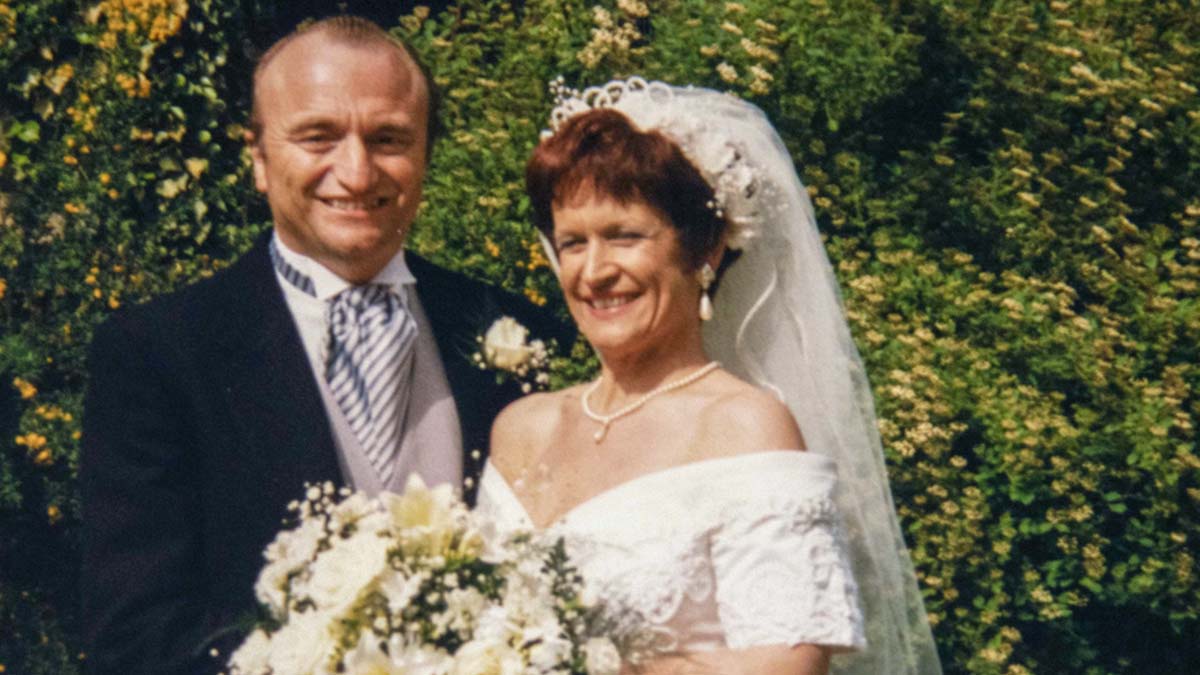
“Eventually we got a car, a 1952 Pontiac with rusted headlights, an engineering flaw. The headlights were set into a hollow sphere so dirt and water could easily accumulate, but we had wheels.” When Debbie was about five, Mary returned to England with their daughter. David was heartbroken. He had grown close to his family, especially little Debbie. Now, he was sad and lonely. “I took refuge in bartending for the Toronto Argonauts Football Stadium and for the Chamber of Commerce. At that time, you sold liquor by the bottle, not the glass. It was $45 a bottle which I took to each table, earning $24 a night.”
In 1967, David was introduced to Joan, a ballroom dancer. The couple soon made ballroom dancing their mainstay at the Legion. “I tried to join the Legion, but they refused me because they did not recognize the Theatre of Operation in Africa and the Suez Canal, where I had been stationed.” This didn’t slow down his dancing with Joan.
“Joan had a son, Paul, one-year-old, from a previous marriage and David adopted Paul to make his new family complete. Joan’s mother, Mary W. Morrison (Allen) was the first person to provide inoculations after the Banting and Best discovery of insulin. Her mother recalled Dr. Banting sharing with her that he was unhappy when his second in command also won the Nobel Prize. This information had come out in a recording made 60 years ago and her mother’s name had likely been mentioned.”
David and Joan became experts, well-known in the ballroom dancing circles, winning many championships. “One time, we travelled to Blackpool, England the Mecca of dancing, as part of a Canadian delegation. Joan’s dress had arrived in a shoe box, all the way from Australia. It sprang to life beautifully when released from the box.” The pair won the championship.
At 55, David became jobless. Through layoffs and cuts, he lost his position. “I was supposed to get a week’s wage for every year worked but the company cheated us. I was disenfranchised at age 55 with no insurance and this had been going on for many workers for many years. Two workers took over my job.” This was when Manitoulin became a place of interest. Joan was going to do an interview for the Manitoulin West Recorder. She interviewed Richard Rohmer of the Royal Canadian Air Force. He was an historian and a lawyer. Joan wound up working for the Recorder
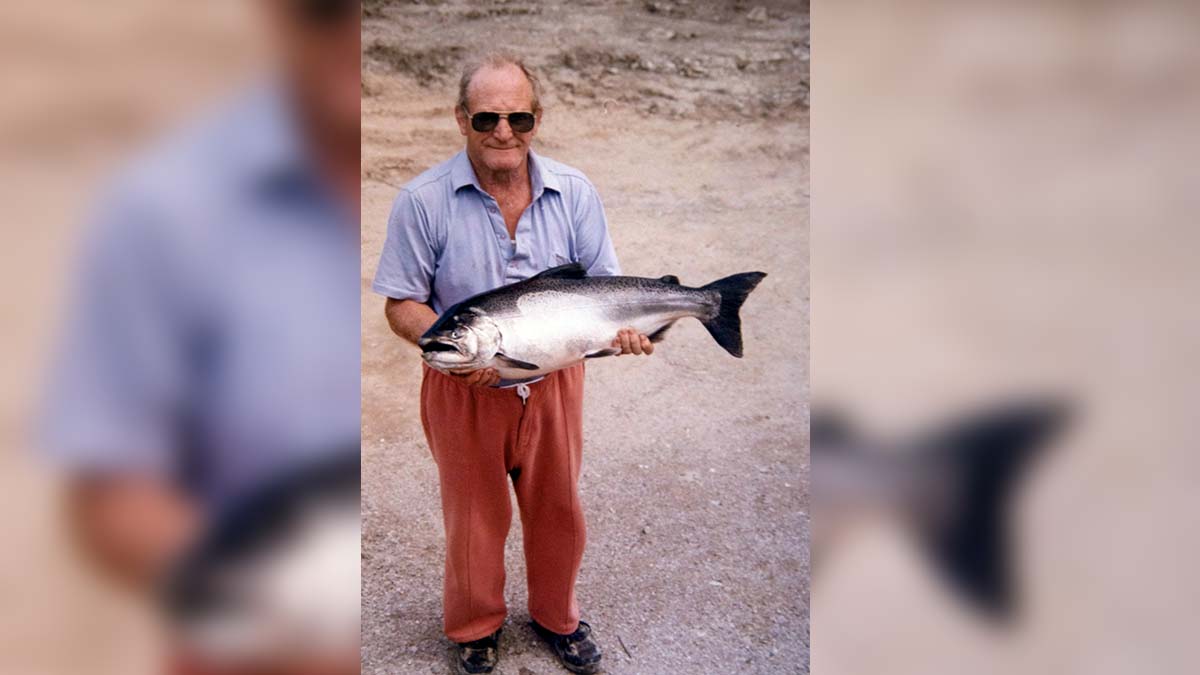
Manitoulin looked like an interesting place to live, so Joan and David decided to buy a home. David connected with a sibling, his sister Jean in Britain, and got daughter Debbie’s address and David has been corresponding with her on a regular basis. Debbie and her husband came to Manitoulin Island for a visit. Both father and daughter professed their regrets at having had no contact with each other for so many years. David was happy to see a definite likeness in his daughter’s appearance. Both father and daughter also have two webbed toes. The two couples had dinner together at Niagara Falls and did a bit of sightseeing together.
What is an early memory of yours? “It seems, at birth, I was an angel to my mother but a ‘pain in the backside’ to the nurses. A baby was added to our family about every 18 months. I remember as a young boy falling on a table edge and being badly hurt. They had to operate on me, and I was lucky to survive. I also recall being referred to as a ‘ginger head.’ Both my oldest brother and I had red hair. I was always in trouble because of my red hair and freckles.”
“Favourite pets? A black lab named Gypsy. When we lived on the road to the lighthouse in Gore Bay, we were high on a hill on two acres of land. Favourite television show? An A&E show about criminals.” “Strengths? Ballroom dancing. I seem to have inherited a natural ability to interpret ‘time and tempo’ from my dad. The tempo just seems to come to me at the right time. My dad, only five feet tall, and a great dancer, was nicknamed ‘the Duke of Digbeth.’”
“What are you most proud of? Being an Englishman and being self-taught. Educated kids and parents are programmed to know what to do to be successful. I wouldn’t have done half the stuff I did do if I had been privy to more guidance from my parents and teachers. You live with the consequences of your actions.”
Looking back, is there something you would do differently if you could go back in time? “I would have gotten more education. Children can learn quickly, but it’s different if you can only rely on yourself.”
Is there something you would still like to do? “Go fishing. We had a good boat, Joan and I, but in Gore Bay you can get six-foot waves. We had a big trailer, and we went south in the winter. Joan loved photography, so we accumulated 50 years of camera equipment from her work. She died two years ago.”
“As for my birth family, we had two judges in the high court in England and one lawyer. All my brothers are gone now. Only Margaret and Kate remain of my sisters. I have had a bout with colon cancer and a cerebral hemorrhage, but Doctor Schneider, an excellent surgeon, saved me both times. ‘Live your life as it happens’ is my advice. You go through many stages, and you need to accept what comes. I only went to grade eight in school. Making mistakes is the expensive way to learn, but it does work.”
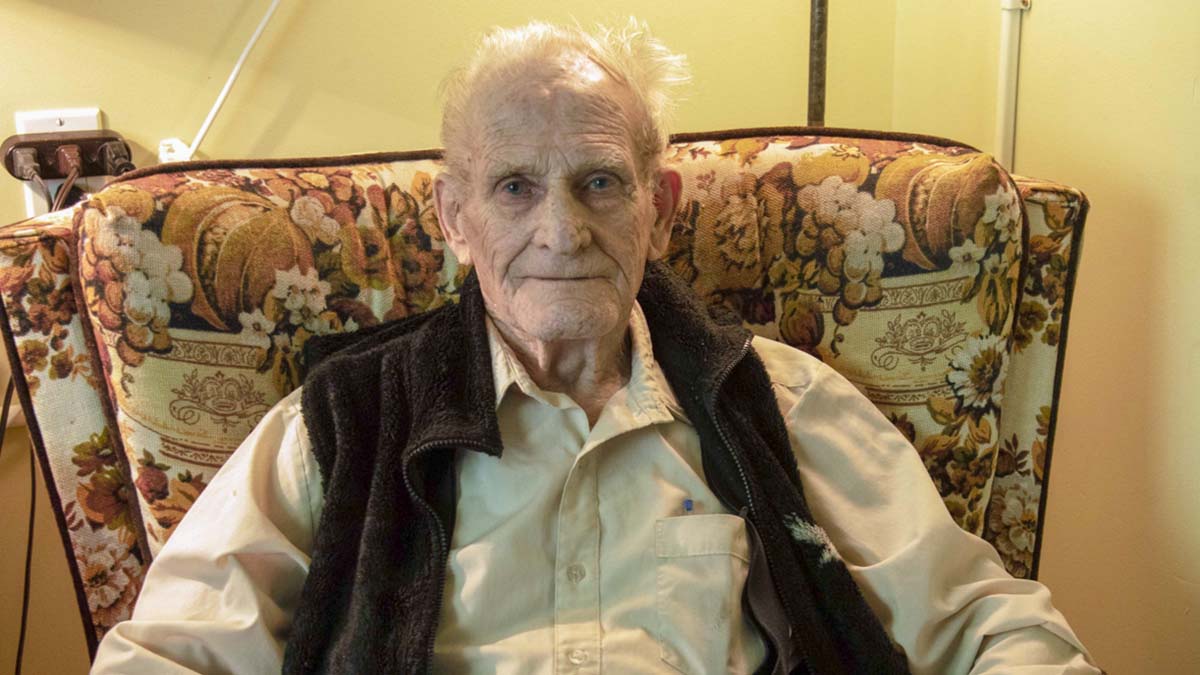
“There is no place like Manitoulin. There isn’t much shopping, but you feel free with so little traffic. People here are very close, interconnected from a handful of pioneer families who came here many years ago. The scenery is splendid. When you go up the hill in Gore Bay, you can see all the way to Spanish. Randy Noble and Noel Debassige built a house for us on the bluff 30 years ago. We loved it there. Our last house was the one near the lighthouse in Gore Bay. The Island continues to be a beautiful place to retire for so many of us. Once you come here, you want to stay.”

